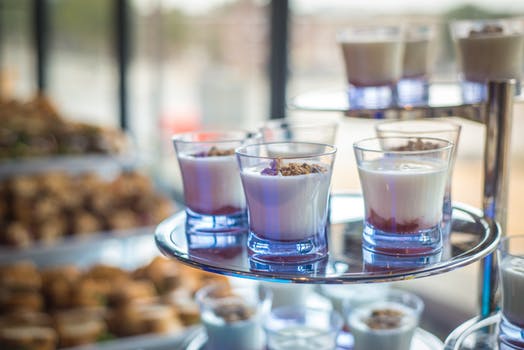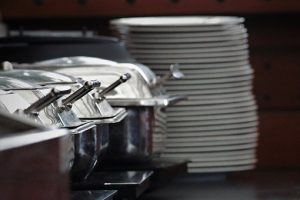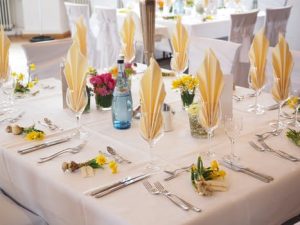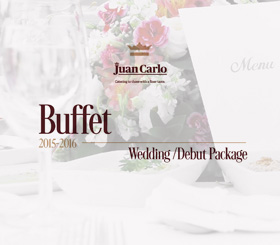Have an Unforgettable Experience with the Perfect Wedding Catering Service
When the time comes for you to finally have your wedding, you probably want everything to go perfectly. Weddings are a stressful affair so you need all the help you can get to make things easier. One thing that can help take some of your worries away is a perfect wedding catering service.
Aside from the newlyweds, some consider the food to be the star of a good wedding. Caterers ensure that their menu complements the theme of your wedding. You can rest easy knowing that they can handle every detail, from the flowers, to the entertainment, to incredible food.
A catering service has the potential to make or break your wedding. Choosing the perfect one for you can save you time, money and worry, so make your wedding unforgettable by going with the perfect catering service.
What is a catering service?
Catering is defined as the business of providing food services at a remote location such as a hospital, hotel, cruise ship, or events like weddings. A wedding catering service, then, is a caterer that provides food and beverage to a wedding party and can be part of a wedding package or can be hired independently.
Catering service history
There have been records of major catering services in the United States as far back as 1778 when a ball in Philadelphia was catered by Caesar Cranshell in celebration of the departure of British General William Howe.
Catering businesses took hold in Philadelphia around 1820. Most of these businesses were founded mainly by African-Americans and became a profitable and respectable business. Robert Bogle is recognized as the “originator of catering” and under him, the industry began to professionalize.
The word “caterer” became commonly used in the 1880s as local directories began listing numerous caterers. By creating simpler menus, the Soviet Union began holding state public catering establishments in the 1930s. Catering became the norm when a rationing system was implemented during World War 2.
Many businessmen turned to catering after the Second World War as a way of staying in business in a war-torn country and by the 1960s, eating in public catering establishments overtook eating food made at home.
What should you expect from a catering service?
The services vary from caterer to caterer but generally, they should provide the food and the equipment required to serve the food such as spoons, ladles, tongs, etc. Certain venues will usually provide other items such as silverware, plates, and napkins but if they don’t, your caterer can provide them too.
Booking a good wedding catering service should be a simple, straightforward, and exciting process. The best ones should also provide a full event planning service in addition to catering so you can leave everything from finding a venue to flower arrangements to them.
You should expect an informal conversation with no pressure in the beginning just so you and your caterer can get an idea of who the other is. The caterer is there to find out what you like or don’t like, and you can either do it over the phone or in your home depending on your location.
After getting an idea of what you want, you can begin working with your caterer by first checking their availability. Find out which venues your caterers have worked at already and make a few phone calls to these venues to see who they like to work with. First-hand opinions form the people who have interacted with your caterer are always welcome.
Some venues have an in-house catering team but others, especially ones that are not purpose-built and unique event spaces are simply structures without a catering team onsite. Your caterer should be able to handle the work whichever venue you choose for your wedding. You should not have to worry about whether a venue has usable kitchen facilities; your caterers will look after all that!
Finally, your caterer should probably specialize in a type of cooking. You might have a style of cooking you prefer for your wedding whether it’s traditional or modern. By this point your caterer can already provide you with a rough estimate of costs; be upfront if you the price is to your liking so you don’t waste each other’s time.
Kinds and types of catering
For most people, when they think of catering, they probably think picking hors d’oeuvres off of a tray in a party or an all-you-can-eat buffet. Catering is much more than those; there are many types of foodservice operations that fall under its domain. Learn about the different kinds of catering and what they entail for you.
Event catering
This kind of catering provides food for special events such as large-scale parties, receptions, anniversaries, and of course, weddings. If you are looking for a catering service for your wedding, this is the choice for you. Special event catering involves not just the service of food, but also different aspects of event planning. While some of these caterers only focus on one event, there are others that can do it all.
Business catering
Business caterers provide food for business functions such as meetings, lunches, training sessions, conferences, and corporate parties. This form of catering is in high demand although the competition in the market can be difficult.
Mobile catering
This catering is not done through contracting but rather, moves from one place to another in a truck or van designed to carry equipment and food. Some examples of mobile catering include vendors at farmers markets, fairs, festivals, parking-lot vendors, and meals-to-go services. Mobile catering can also sometimes overlap with mobile concessions because the two are similar to each other.
Industrial catering
Industrial caterers provide meals for prisons, factories, schools, hospitals, universities, airlines, and other institution. One popular example of this catering type is Aramark which is based in the United States.
Each of these catering types has their own appeal and drawbacks. You don’t have to limit yourself to choosing a single type of catering service. In fact, a majority of these catering businesses will also cater wedding and receptions.
What makes a good catering service?
Reaching the level of being a renowned wedding catering service provider is not easy. So, what exactly makes a good catering service? Like any other business, good catering services pride themselves on their hard work, determination, honesty, proper training, discipline, and honed skills. Besides that, there are other traits that make a good catering service:
Making good food
First and foremost, catering is all about providing good food. No matter how flashy or beautiful the venue of your wedding is, if the food is not well prepared, then they are not good caterers. Caterers should be experienced with food preparation; after all, you don’t want to serve your guests food that they will not like. Another important detail apart from making great tasting food is ensuring that the food is safe.
Paying attention to customers
Nothing garners loyalty from clients more than having excellent customer care. The caterer you choose should be diplomatic, thoughtful, and polite while dealing with clientele. The best caterers are those who put care in how they handle their clients and the language they use with them, resulting in recommendations and repeat customers. Caterers need to make sure that their menu outline is clear so you can understand them better. Should anything on their end change, it is important that they let you know right away.
Having good teamwork
A good caterer should be able to supervise their servers, cleaners, dishwashers, and cooks. Teamwork is important in any business, not just catering, in order to keep things running. A good leader does not just order their staff around, but rather, they lead by example. Whoever the person is in charge of your catering should know how to manage everyone on their team and make quick decisions and take quick actions where required.
Serving drinks
The drinks are just as important as the food when it comes to catering services. A good meal accompanied with the right beverages can make it great. A caterer should prioritize their guests’ safety by serving not just drinks but provide high-quality beverages.
Being flexible
A caterer that is flexible can change with the needs of their client. Because every client is unique, no two events will be like the other; your caterer should have a plan for each one. They should be able to handle any requirements, say, a sudden change in the menu due to dietary restrictions, without any hesitation.
Popular wedding catering styles
The next big decisions you now have to make with your wedding catering service provider is choosing what food to serve your guests and how you are going to serve them. Couples back in the day only had a choice between a sit-down dinner or a buffet. Today, deciding the food you are serving to your guests comes down to more than just plated or buffet. Here are a few options you have with food for your wedding that a catering service can help you with.
Classic sit-down dinner
This is the traditional option for weddings where guests are seated and served a formal dinner. Guests are typically served three courses: an appetizer, an entree, and a dessert. Your caterer will usually give your guests a choice of two to three entrees which they select beforehand. Another option is to serve each guest two proteins, such as meat and fish, on a single plate (sometimes referred to as a “duet” plate).
Buffet-style
A buffet features all of the dinner offerings presented in a line usually on long tables. Typically, servers are there behind the buffet to provide information for each dish (especially for allergy purposes) and to put appropriate portions on each guest’s plate. It is not uncommon to have two separate buffet tables, especially if the wedding is large, to accommodate more guests. The buffet should remain open for all the guests to make at least one trip through, and then for extra-hungry guests to visit again.
Self-service food stations
Food stations have become a very popular wedding catering style because it can be open for much longer than a buffet and just as satisfying a seated or plated meal. Unlike a buffet that directs your guests through the food in the same order, a food station breaks up your food displays with different tables offering different things, often by category. Stations are a fun way to include your wedding theme into your food.
Family-style dinner
Just like a sit-down dinner, a family-style reception has guests seated at specific dinner tables and have waiters bring the food to their table. Large portions of the dinner serving are placed on each table using serving platters and guests are encouraged to fill their own plates. The experience is similar to sitting down for dinner at home with your family.
Cocktail-style reception
This fare is a more recent trend featuring hors-d’oeuvres and other small bites served throughout the occasion instead of a sit-down meal. The hors d’oeuvres can be a combination of hot and cold food and are usually one- or two- bite portions. The food can be distributed by servers or left stationary for guests to help themselves. This style is perfect for couples who want a more casual atmosphere and want their guests to meet and mingle with each other.
Why Juan Carlo is the perfect choice
If you are planning to have your wedding catered in the Philippines, there is no better choice than Juan Carlo. Their wedding packages have all you need so you no longer have to worry everything else; all you have to do is walk down the aisle or meet your bride at the altar!
If food and beverage diversity is important for you, then go with Juan Carlo. They have a wide variety of menu options to choose from and each menu brings a familiar and wonderful taste.
Juan Carlo has been the top choice for wedding catering service for the past 20 years, working on the biggest events with the brightest stars in the country. They have received numerous awards and recognition both in this country and abroad.
Have Juan Carlo cater your wedding right now by clicking this link. Find out more about what they can do for you on the most important day of your life!
Bringing Elegance in your Celebration
Get our exclusive menu right in your Inbox!
Recent Posts

Contact Us

24B 11th Jamboree St. Tomas Morato, Quezon City
National Highway Soro-soro Karsada, Batangas City










